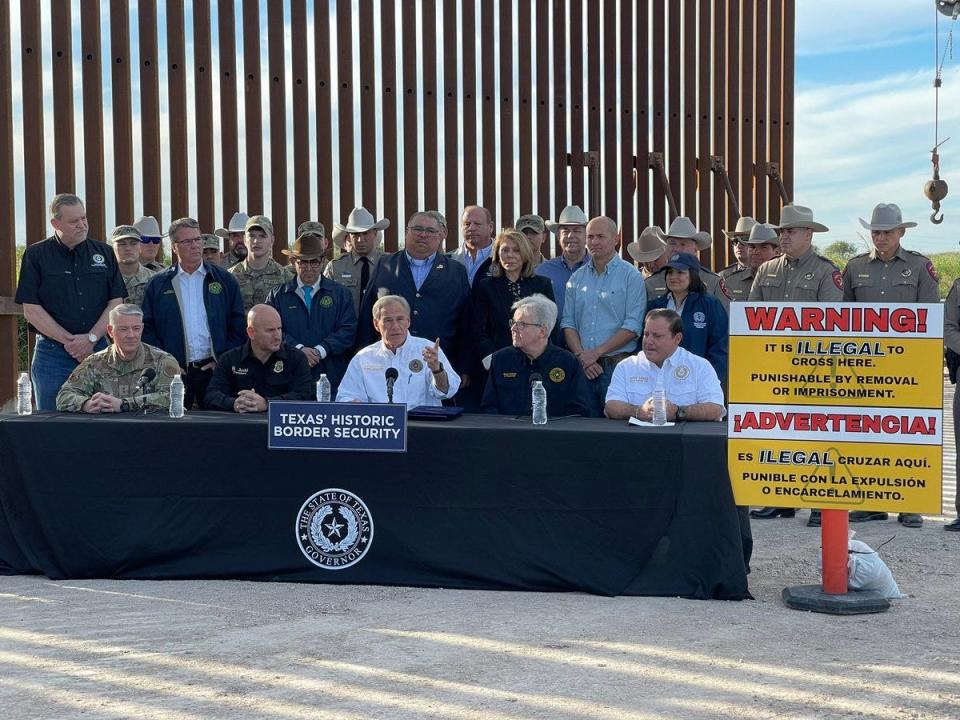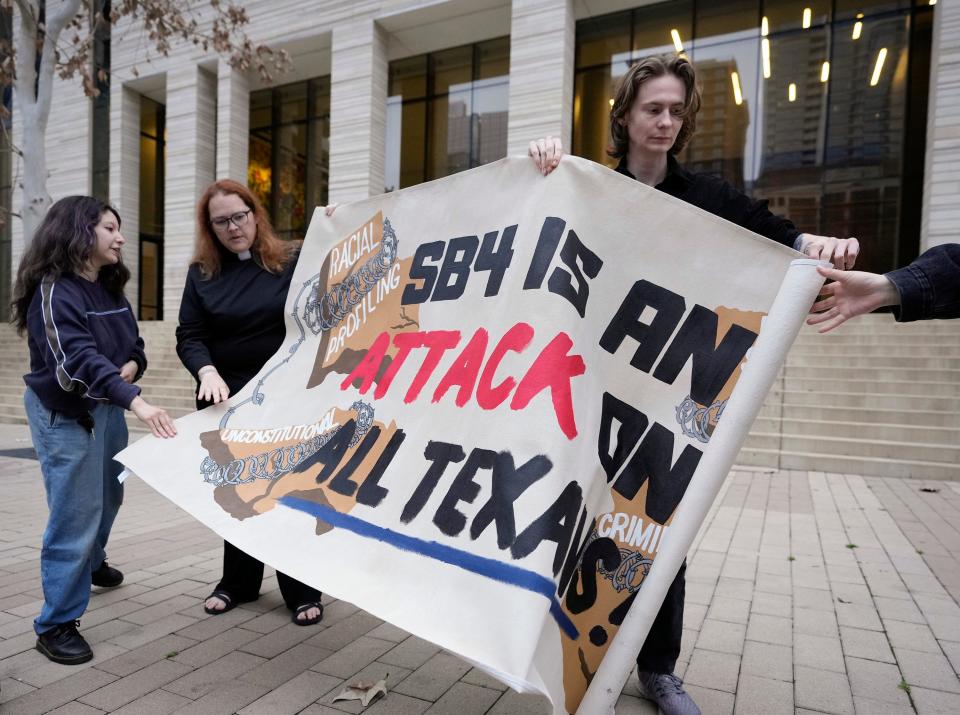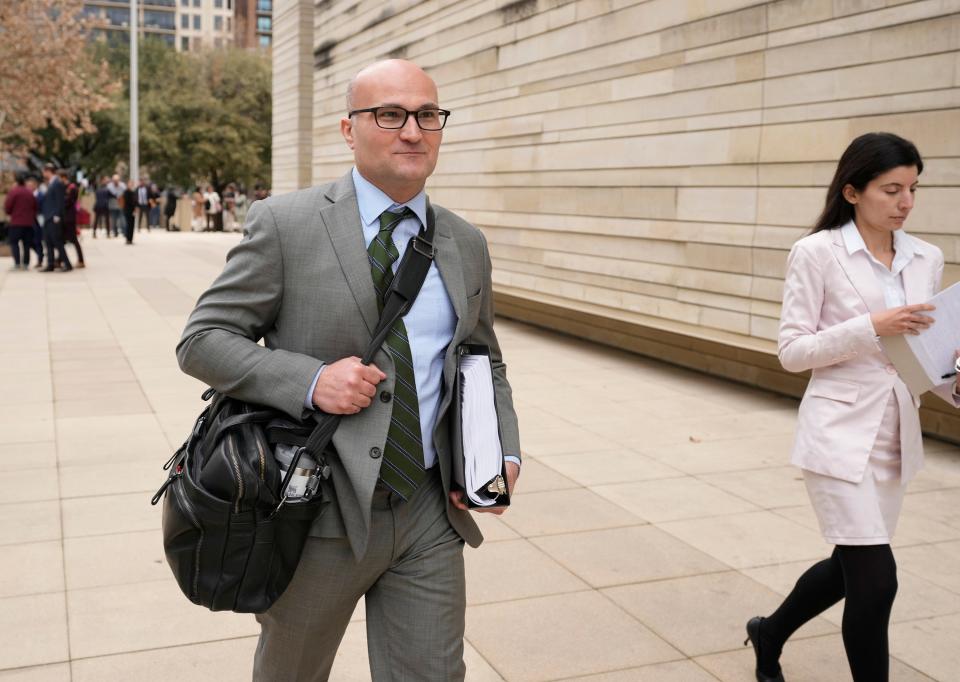Appeals court OKs Texas immigration law to take effect Sunday unless Supreme Court steps in
Update: The U.S. Supreme Court on Monday evening accepted an emergency appeal from the U.S. Justice Department and kept a hold on SB 4 until at least March 13, preventing the Texas law that empowers state law enforcement officers to detain and deport migrants suspected of illegally entering or living in the U.S. from going into effect Sunday.
The 5th U.S. Circuit Court of Appeals will allow a sweeping and controversial border security package that Texas lawmakers passed last year to go into effect at 12:01 a.m. Sunday — paving the way for state law officers to arrest people suspected of illegally crossing into Texas from Mexico and allowing state judges to issue deportation orders — unless the U.S. Supreme Court intervenes, according to an order the court issued over the weekend.
The New Orleans-based appeals court's decision came a day after Judge David Ezra of the U.S. District Court for the Western District of Texas on Friday issued a ruling to temporarily block the law from going into effect while its constitutional challenge is settled.
"Several factors warrant an injunction," Ezra wrote in enjoining Senate Bill 4 on Friday. "First, the Supremacy Clause, and Supreme Court precedent affirm that states may not exercise immigration enforcement power except as authorized by the federal government."
However, in reversing the lower court's ruling, the appeals court allowed SB 4, which was previously scheduled to take effect Tuesday, to become active Sunday. As per its brief memo, the appeals court delayed its decision from taking effect for seven days to allow the federal government time to appeal the order to the Supreme Court.
On Monday, federal prosecutors made that petition to the Supreme Court, which the country's high court accepted later in the day, to consider overturning the appeals court's decision based on long-standing court precedent on border issues.
"This court has long recognized that the regulation of entry and removal of noncitizens is inseparably intertwined with the conduct of foreign relations and thus vested 'solely in the federal government,’” federal prosecutors wrote in asking to reinstate the District Court’s injunction.
In response to the Supreme Court's intervention, migrant advocacy groups — including the ACLU, Las Americas and the League of United Latin American Citizens — were "cautiously optimistic" and view the continued delay of SB 4's implementation as "encouraging."
"This is a step in the right direction and a moment to celebrate the importance of checks and balances in our legal system," said state Rep. Victoria Neave Criado, D-Dallas, the chair of the House Mexican American Legislative Caucus.
Earlier on Monday before the Supreme Court's intervention, Gov. Greg Abbott in a short post on X, formerly Twitter, welcomed the appeals court ruling as "huge news."

"Federal appeals court allows Texas immigration law to take effect," Abbott said. "Law enforcement officers in Texas are now authorized to arrest & jail any illegal immigrants crossing the border."
In a follow-up post nearly an hour later, Abbott clarified that law enforcement officers will be allowed to start enforcing SB 4 only if the Supreme Court doesn't take up the case by Saturday.
In November, the state Legislature passed SB 4, creating a series of penalties for anyone suspected of crossing the Texas-Mexico border into the U.S. other than through a legal international port of entry. The penalties range from a Class B misdemeanor to a second-degree felony.

SB 4, which faced heavy opposition from Democrats and civil rights groups throughout the 2023 legislative calendar, also requires people accused of illegally crossing into Texas to either accept a magistrate judge's deportation order or face a second-degree felony charge for noncompliance.
Rep. David Spiller, R-Jacksboro, who wrote the House's final version of SB 4, said the appeals court ruling is "great news for Texas" and that federal prosecutors have failed to make a successful argument on the harms that could be caused by the state's immigration law taking effect.
"The injunction shouldn’t have ever been granted because the DOJ failed to prove they were likely to succeed on the merits, and that SB 4 would have inflicted irreparable harm to the US — both requisite steps for the issuance of a temporary injunction," Spiller said Monday on X.
More: Far-right billionaires throw money at Republican primary to weed out enemies of AG Paxton
In reversing the lower court's injunction on SB 4 taking effect, Judges Edith Clement, Kurt Engelhardt and Irma Ramirez said the court's consideration of Texas' immigration law will be expedited, with the case to be taken up on the "next available oral argument calendar." As of Monday, no date had been set.
The appeals court decision was not unanimous by the three-judge panel, with Ramirez saying she would not have granted the temporary stay and instead favored deferring that decision to the judges panel that will hear oral arguments on the case, according to the court's order published Saturday.
The U.S. Department of Justice filed its lawsuit against Texas to stop SB 4 in January, joining previous suits filed late last year by the ACLU, the ACLU of Texas, Las Americas Immigrant Advocacy Center, American Gateways, the Texas Civil Rights Project and El Paso County.

During oral arguments Feb. 15 in Ezra's federal courtroom in Austin, the state's attorneys defending SB 4 said the surge in migrants into Texas warrants state-level immigration provisions. Ezra, while complimentary of the argument presented by Ryan Walters, the state attorney general's office special litigation chief, entirely disagreed with the state's premise in his ruling.
"Finally, to allow Texas to permanently supersede federal directives on the basis of an invasion would amount to nullification of federal law and authority — a notion that is antithetical to the Constitution and has been unequivocally rejected by federal courts since the Civil War," Ezra wrote.
More: Here's our Texas primary election voter guide before voting on Super Tuesday
During the February hearing, federal prosecutors bemoaned Texas' effort to enact immigration law as a clear overstep into the federal government's authority, laying out their case arguing that the state lacks the authority to determine the ingress and egress of migrants along the southern border.
After Ezra's ruling and the state's immediate appeal, Abbott and Attorney General Ken Paxton said their intent is to continue fighting for the state law with the purpose of reaching the Supreme Court for a final decision.
This article originally appeared on Austin American-Statesman: US appeals court allows Texas Senate Bill 4 to take effect Sunday
Solve the daily Crossword

